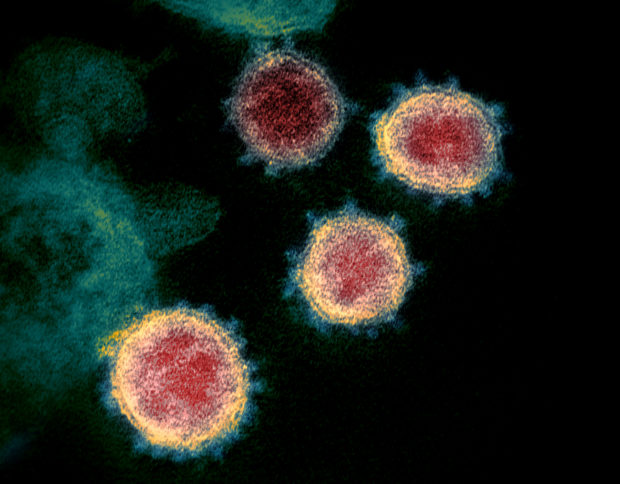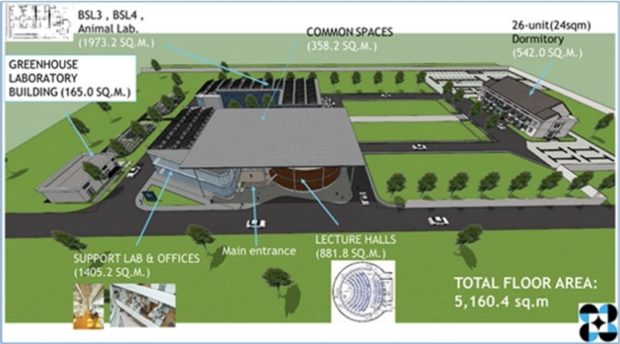PH’s Virology Institute to rise in end-2023 or in 2024 — DOST

FILE PHOTO: This undated transmission electron microscope image shows SARS-CoV-2, also known as novel coronavirus, the virus that causes COVID-19, isolated from a patient in the U.S. NIAID-RML/Handout via REUTERS.
MANILA, Philippines — The coronavirus pandemic is finally giving rise to the creation of the Virology Institute of the Philippines (VIP), which may rise at the New Clark Economic Zone in Capas, Tarlac by the end of 2023 or in 2024, the Department of Science and Technology (DOST) said Tuesday.
DOST Undersecretary for Research and Development Rowena Cristina Guevara said that the department and the Bases Conversion and Development Authority are currently finalizing the term sheet before signing the lease contract for the “state-of-the-art” facility.
Guevara said the Department of Budget and Management has allotted P50 million to the Department of Public Works and Highways for the design of the VIP this year so that construction may start in 2022.
The construction of the building, she said, may take two years to be completed.
“So siguro, end of 2023, 2024, nakabukas na ‘yung building (Maybe by the end of 2023 or in 2014, the building will already be open),” she said in an online media forum.
But even without the building in Tarlac, the virology institute can still be partially operated at the DOST’s Industrial Technology Development Institute, according to Guevara.
Earlier, Guevara said that the virology institute “will not only deal with human viruses but with viruses against animals and plants,” noting that the Philippines is currently still incapable of developing a vaccine against the coronavirus disease (COVID-19).
This is among the long terms plans of the government to strengthen local vaccine development, especially in the face of the raging COVID-19 pandemic, and which had been the subject of President Rodrigo Duterte’s review of the recommendation to establish a virology institute.
Six initial projects
While the bill for the operation of the VIP is still pending in Congress, the DOST has already initiated research and development works for the VIP program.
The DOST is currently implementing six projects to start the VIP program in partnership with the Baylor College of Medicine in the United States, St. Luke’s Medical Center, and Research Institute for Tropical Medicine.
“The six projects will focus on the fields of human, animal, and plant virology and the research areas of diagnostics, therapeutics, and vaccines,” said Guevara.
She said an initial fund of P284 million has been allotted for six projects, including collaborative projects with other institutions.
One of the projects will focus on viruses in animals that may become zoonotic and transferred to humans.
“There are reports that SARS-CoV-2, the causative agent for COVID-19, is a zoonotic virus. Thus, studying them now may help prevent another pandemic from happening,” the DOST official said.
Another project aims to detect the African swine fever virus in the field and yield results in two hours. “Results of this project would be beneficial, especially for the local hog raising industry,” said Guevara.
Meanwhile, another project on plant viruses would look into the tomato yellow leaf curl virus, which infects tomatoes, a multi-million sector in the country. Guevara said the virus can also infect beans, pepper, tobacco, cucumbers, and other important crops, translating to millions in losses.
The other projects aim to detect food and waterborne pathogens and treat bacterial infection.
“With these projects, DOST hopes to build the VIP capacity and help resolve some of the pressing issues in our country brought by viruses,” added Guevara.
Facility design
The DOST also urged the participation of Filipino scientists abroad for the VIP program. According to Guevara, seven “balik scientists” are now working closely with the department for the initial projects of the institute.
Guevara assured that the design of the VIP facility is based on existing guidelines of the World Health Organization on establishing virology laboratories in compliance with biosafety and biosecurity protocols.
“It is equipped with an animal house and a greenhouse for animal and plant virus research. Aside from Biosafety Level-2 (BSL-2) laboratories, it will have biosafety level 3 (BSL-3) laboratories and the maximum containment level, BSL-4 laboratory—a first in the Philippines,” she said.
Guevara noted that the DOST needs the bill for the VIP to be passed in order to secure funding for the facility, research and development works, and human resources.
